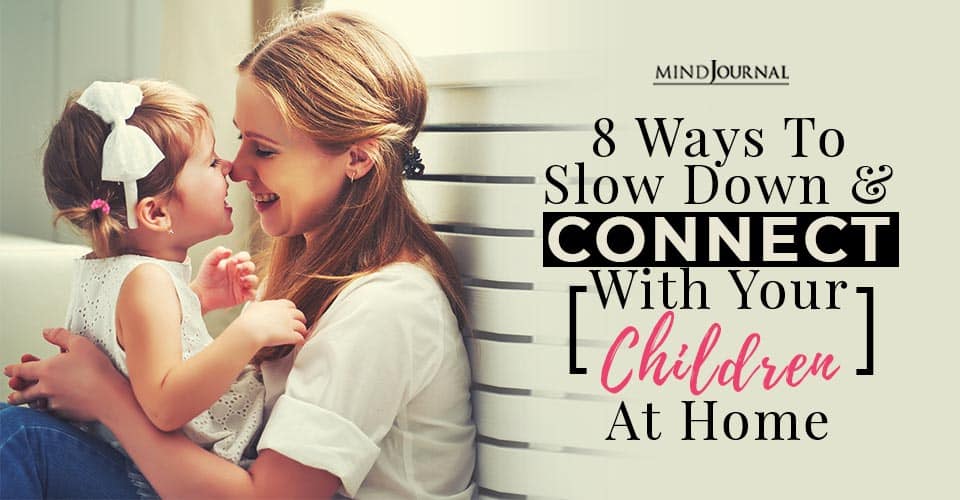Are you wondering how you can slow down and connect with your children at home? And most importantly, what you are teaching your children?
Being at home with your children under one roof can be challenging, but amidst a pandemic with the added strain can be really stressful!
How can you use this time to connect more authentically at home with your children in quarantine?
Here are 8 ways to slow down and connect with your children at home.
1. Slow down.
You’re probably feeling frustrated with reactionary emotions to a difficult situation. Slowing down and getting real with your emotions shows your kids how to be resilient.
The first step is making a distinction between worry and concern. Sharing your authentic emotions from concern is different than reacting from worry. Your emotions show up when you’re willing to be vulnerable and a calming strength lives here.
Worrying causes:
- Stress
- Poor health
- Low energy
- Inability to “self-repair”
The impact of worrying creates fear and an inability to act because you’re in “reactive” mode and you fail to connect with your children.
Concern, on the other hand, accepts uncertainty, but instead of living from fear, you live from faith. You feel more cautious but can still move forward.
By getting in touch with your authentic emotions, you’ll express and release them from your body instead of letting them become toxic to you. Allowing panic and anxiety to control you isn’t helpful to push onto your children. You’re there to help manage their fears.
Concern seeks inner peace so you can find clarity amidst any chaos. Using your emotions gives your kids permission to do the same.
2. Pay attention to how you speak.
What you say when things go wrong has a deep impact on the way your children speak to themselves. Wander back to your childhood to a time when you messed up… Remember how you felt. What did you most need to hear?
Have the courage to say to your child what you wanted to hear, instead of responding with a lecture. Once emotions have subsided and you’re not in a reactive mode, respond by “sharing” what wasn’t working, not “telling” them what went wrong.
Do you know how hard your child can be on themselves when they’ve made a mistake and there’s punishment, silence, or a condescending look?
Do you understand how abandoned a child can feel when you turn your back on them with punishment or shame, instead of meeting them with compassion and understanding?
So much of the way children think and why they behave the way they do is hidden from you. Discovering what’s underneath requires listening and empathizing.
What you “tell” your children — even with good intentions — can cause them to shut down and feel unheard. If you’re getting resistance, that’s how you’ll know you need to rethink your words and overall communication style.
Notice your words, the tone you have, and your emotion (usually anger and frustration) — all of it will land as blame.
Check-in with your own inner voice for how you speak to yourself. Is it patient and curious or harsh and self-critical? That’s the same voice your child hears.
3. Understand what your child experiences in media.
Your children aren’t just dealing with you, but the increasingly louder voices among peers and the media. Are you aware of the tone in the environment surrounding them?
Are the games they play, the shows they watch, or Instagram stories they follow more competitive and reactive, or respectful and non-judgmental?
How might what you watch and listen to affect what becomes acceptable in your home interactions?
The media leans toward dysfunctional drama and prefers negativity because that’s what sells. There’s an insidious level of judgment, attack, and gossip that can creep in and appear normal.
When you can find media that’s meaningful and resonates with both you and your child, it’s an opportunity to have authentic conversations and connect with your children.
4. Redefine “failure.”
If you want to connect with your children, notice your reaction when your child messes up. Sure, you may be sad, frustrated, even furious, but what do you do with these emotions? Your child isn’t causing your emotions.
They don’t have the power to make you angry; you’re responsible for how you feel. Children have a natural desire to please and not disappoint, but they need a safe space to stumble and fall so they can learn and grow. No one wants to mess up, so acknowledging their feelings, and you being present with their emotions is life-changing.
Here’s how to acknowledge:
- “I notice you’re angry or upset.”
- “I sense something’s not working for you.”
- “I realize you need your space.”
- “You seem sad or frustrated.”
Then… “Can you tell me what happened?”
Actively listen with curiosity from where they are, not from where you are if you want to connect with your children. Your faith in them despite their failings allows them to show up authentically.
5. Stop criticizing.
You want your children to believe, “I can do this,” but what they often hear growing up when they make mistakes sends a different message: “I’m not good enough.”
Do any of these questions sound familiar?
- “How could you not know?”
- “What’s the matter with you?”
- “Why is this taking so long?”
- “Are you kidding me?”
- “What were you thinking?!”
These are expressions of criticism that form your child’s “inner critic” and create the fear of not being good enough early on. Criticism of a child’s behavior creates guilt.
What’s tougher are the expressions of judgment that form your child’s “inner judge.”
- “How could you be so stupid?”
- “So, if your friends do something, you blindly follow like an idiot?”
- “That outfit makes you look _______ (fat, too big, silly, ridiculous…)”
- “Stop crying like a baby! That’s nothing to be upset over.”
- “You’re such a disappointment!”
It’s easy to justify criticism and judgment because you have your “right way” as a parent and believe you know better. Let that go.
Remind yourself that your child is your greatest gift and is trying their best to learn new things. What they need is someone who’s willing to listen to their world with patience, understanding, and compassion. They need common-sense rules and guidance.
Your “why” is the biggest piece missing for kids. Why do they need to care? What do you want them to understand? These are your values.
Contrary to popular belief, punishment is not necessary for children to learn a lesson. It’s taking the time to communicate what went wrong and why which makes it easy to connect with your children.
Criticism creates an invisible wall between you and your child. What will you share if there’s a fear of judgment or criticism? Not a whole lot.
6. Let go of expectations.
Children today feel enormous pressure because of the expectations to be happy and successful. Have you ever said, “You should be happy! Do you know what I had in my day?”
Today, there’s a mental-health crisis in children with increasing suicide rates, and many young people take pills or are in therapy, unable to cope with stress and anxiety.
You want the world for your children, and they feel like they have to deliver. Children want to please their parents. Expectations backfire to create a silent pressure for children to be more than what they can see in themselves.
Connect with you children by encouraging your children to try new things often runs into resistance. There’s a push into activities to “make them happy,” but is it working?
Finding the kinds of experiences that really light your child up requires you to slow down and pay attention to what they’re drawn to and encourage those things. That’s how they discover their passions.
Your first reaction comes from why something’s not working for you based on your expectations, but whatever a child chooses makes sense for them, so find out what that might be.
7. Build trust.
Have you ever found yourself shouting at your child to stop yelling?
Have you ever sworn you wouldn’t repeat what you heard growing up? Yet there it goes flying out of your mouth in those high-stress moments.
When you take responsibility and apologize when you mess up, you’ll find your child one day apologizing without you needing to say a single thing. You may think the parent role demands tough love, control, and authority, but clear guidelines mixed with kindness and compassion is so much more effective in the long run.
When you give children the freedom to explore their world with supportive guidance and fewer rules, you’re teaching them to think for themselves and make decisions.
Giving in to your children when they need you to be firm backfires because they learn how to manipulate you. They learn not to trust you because you are not trusting yourself. You’ll be experiencing fewer temper tantrums and outright rebellion in the teen years by allowing your child to find their authentic self while making sure they’re safe and healthy.
Related: 9 Tips For Co-Parenting With A Difficult Ex
8. Accept your child as they are.
The idea of unconditional love can be a confusing concept, but it reaches the deepest part of how authentic you can be with your children.
Have you ever noticed the way your child drives you most crazy is the same trait you have? It feels like a part of them you don’t accept or like. If you’re stubborn, that stubbornness in your child is going to set you off.
Until you can look in the mirror and say, “I love and accept myself exactly as I am,” and integrate those parts of yourself, it’s hard to accept that in your child. The way you struggle is exactly the way your child does. Until you own it with compassion, you’ll have a tough time connecting with the authentic part beneath.
What other ways do you know to deeply connect with your children at home? Leave a comment below.
Originally Appeared On YourTango










Leave a Reply